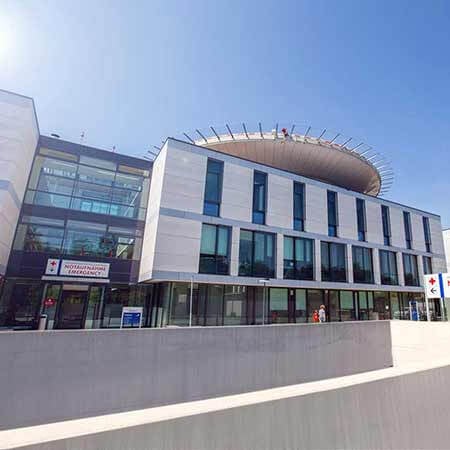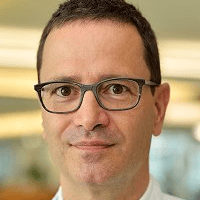Surgical Removal of the Tumor (total — Partial) for Meningioma treatment in the Best Hospitals in the World
Treatment prices are regulated by national law of the corresponding countries, but can also include additional hospital coefficients. In order to receive the individual cost calculation, please send us the request and medical records.

Department of Adult and Pediatric Neurosurgery, Spinal Surgery
The Department of Adult and Pediatric Neurosurgery, Spinal Surgery offers all the possibilities of modern surgical treatment for diseases of the central and peripheral nervous system in patients of all ages. More than 6,000 surgical procedures are performed annually in the department's high-tech operating rooms. Both planned and emergency neurosurgical procedures are performed here. The department's surgical team focuses on patients with cerebrovascular diseases, brain and skull base tumors, spine and spinal cord diseases, cerebrospinal fluid circulation disorders, and pathologies of the peripheral nervous system. The department's team of physicians also has extensive experience in functional neurosurgery: specialists perform deep brain stimulation for movement disorders, spinal cord stimulation for back pain, and vagus nerve stimulation for epilepsy. The department works closely with neurologists, radiologists, and nuclear medicine specialists to provide patients with the highest level of comprehensive medical care. The department is recognized as one of the top neurosurgical centers in Germany and beyond, as evidenced by consistently high treatment success rates and numerous quality certifications, including the German Cancer Society (DKG) Certificate, the German Spine Society (DWG) Certificate, and the Leading Medicine Guide Certificate.







Department of Adult and Pediatric Neurosurgery
The Department of Adult and Pediatric Neurosurgery offers the full range of surgical treatment of diseases of the brain, spine, spinal cord and nerves in adults and children. The department keeps pace with new trends in medicine, as well as contributes significantly to their development. Therefore, the most modern diagnostic and therapeutic methods are available here. An individual approach to each clinical case is crucial to ensure optimal treatment results with the preservation of all neurological functions.


Department of Adult and Pediatric Neurosurgery
According to the Focus magazine, the Department of Adult and Pediatric Neurosurgery ranks among the top German medical facilities specializing in the surgical treatment of brain tumors! The department offers the full range of diagnostics and surgical treatment of diseases of the central and peripheral nervous system. A specially trained team of pediatric neurosurgeons provides treatment for various neurosurgical pathologies in children. During the treatment, the doctors use state-of-the-art equipment, in particular, imaging-guided neuronavigation, functional imaging (fMRI), intraoperative mapping, intraoperative videoangiography, etc.






Meningioma is one of the most common tumors of the central nervous system. It can occur in different parts of the brain and typically grows from the arachnoid membrane. The tumor is fused to the dura mater and bone. In most cases, meningiomas are benign and grow slowly, so they do not reach large sizes and are successfully treated with surgery. In most cases, the surgical removal of meningioma is the curative intervention that leads to the complete recovery. Relapses of bening meningiomas are extremely rare.
Principles of meningioma treatment
Surgery and radiation therapy are used for meningioma treatment. Chemotherapy is rarely used because in most cases, meningioma demonstrates low sensitivity to drugs.
Surgery is used as the first-line treatment method for most patients. Radiation therapy without surgery is used much less frequently. This therapeutic tactics is suitable in the following cases:
- Location of the tumor inconvenient for its surgical removal – if the removal of meningioma is dangerous for the patient and can cause severe neurological deficit
- Poor general health state of the patient associated with both meningioma and concomitant diseases
- Refusal from surgical intervention
Radiation therapy gives the best results when the diameter of the brain tumor is under 3,5 cm. It ensures at least stabilization of the tumor size, and in many patients it reduces size of the neoplasm. Irradiation is safer but less effective than surgery. Radiation therapy does not always cure the disease and may not eliminate all symptoms. In patients, who received radiation without surgery, neurological disorders regress more slowly. Thus, irradiation can’t be the first-line option in patients with aggressive meningiomas that grow fast and are life-threatening.
The purpose of surgery
The main goals of meningioma surgery are as follows:
- Removal of brain tumor, as radical as possible. Radicality of surgery is assessed according to the Simpson grade, from 1 to 5. If possible, the neurosurgeon aims to remove the tumor along with the dura mater and bone, or to coagulate the matrix – the place from which the meningioma grows initially.
- Preservation of nerves and functionally important areas of the brain. It is important that neurological disorders regress after surgery. During the removal of tumor, the doctor seeks to minimize damage to healthy brain tissues, so as not to exacerbate the neurological deficit.
- Cure of the disease. In most cases, it is possible in benign meningiomas. Additional radiation therapy is sometimes required for complete cure or prolonged remission.
- Increased life expectancy. If a complete cure of the pathology is impossible, the doctors strive to achieve the greatest possible recurrence-free period and life expectancy. Most of the recurrences occur in intermediate and malignant meningiomas. Such types of neoplasms require more careful follow-up after the completion of main treatment.
- Elimination of symptoms. Some patients undergo non-radical surgeries – decompression and dilatation of the dura mater.
How is the operation performed?
Brain surgery is performed in the Department of Neurosurgery. General anesthesia is used for pain management. The doctor performs osteoplastic craniotomy, dissects the dura mater, coagulates or ligates blood vessels, depending on their caliber.
Meningiomas can vary in size, location, density, and grade. Therefore, operations in different patients are not the same. Ideally, the doctor removes not only the brain tumor, but also the adjacent part of the dura mater and bone, or coagulates the matrix (growth area of the meningioma) with a laser in order to avoid continued growth of the tumor after surgery. The removed structures sometimes have to be reconstructed from autologous (patient's own) tissues or artificial materials.
Neuronavigation systems, surgical microscopes, and microsurgical techniques are used for removal of meningiomas in a hard-to-reach place. Modern equipment allows the doctor to avoid haemorrhage, damage to large nerves and functionally important areas of the brain. In the best hospitals of the world, operations for removal of meningiomas are not only effective, but also safe for health.
Results of the surgery
The results of the operation for removal of meningioma of the brain are assessed according to the Simpson grade from 1 to 5, where:
1 – total removal of the brain tumors, resection of the pathologically altered bone (hyperostosis) and the dura mater (matrix)
2 – total removal of meningioma of the brain without bone resection, without removal of the dura mater, but with coagulation (destruction) of the matrix
3 – complete removal of the brain tumor without involving the matrix
4 – partial removal of the brain meningioma
5 – decompressive craniectomy, releasing compressed nerves, expanding plastic surgery of the dura mater
1-2 grade surgery according to the Simpson scale is considered total. After the operation, the remains of the brain tumor are not determined macroscopically. After total removal, meningioma rarely recurs or continues to grow.
Other operations are called subtotal. Recurrences are possible after them, if additional treatments are not used.
Is additional treatment necessary?
The need for additional treatment after meningioma surgery depends primarily on the following factors:
- Grade of the brain tumor
- Radicality of its removal
- Patient's health state – whether he can tolerate additional treatments
Chemotherapy for meningioma is not used in most hospitals. Radiation therapy is used for prevention of recurrences.
Depending on the degree of malignancy of the meningioma, the following medical tactics are applied:
- Benign tumor accounts for about 77% of all cases of the disease. Benign neoplasms are usually small in size, as they grow very slowly. They can be removed totally, but even in the case of partial removal, recurrences occur rarely. As a rule, the patient stays under medical supervision and undergoes MRI or CT examinations on the regular basis. Irradiation is indicated only in the case of recurrence of neoplasm.
- Atypical meningioma is diagnosed in 22% of patients. To cure the disease, the total removal of the tumor is required. If it is not completely removed, or the matrix (growth area) is preserved, additional radiation therapy is performed.
- Anaplastic meningioma accounts for only 1% of cases. Such meningiomas almost always recur after resection. Radiation therapy is required even if the surgery has managed to remove the tumor completely.
Why is it better to treat meningioma abroad?
Meningioma surgery is very complicated and not always successful. The tumor is often located in inconvenient places for removal, attached to the dura mater and bone. Meningioma often becomes very dense due to its ossification. Excision of the tumor is usually accompanied by intense bleeding, which leads to blood loss and complicates the work of the surgeon. The operation often has to be complemented by a reconstruction stage – for example, the restoration of the upper sagittal sinus.
This is what the wrong choice of hospital can lead to:
- Insufficient volume of tumor resection and, as a result, continued growth or recurrence of meningioma
- Damage to nerves, functionally important areas of the brain, as a result – severe neurological deficit, poor quality of life after surgery
- Severe haemorrhage during surgery or during the postoperative period with a risk to life
To cure the disease and avoid complications, many patients go abroad. In large foreign hospitals, the treatment is carried out by experienced world-renowned neurosurgeons. They use the latest equipment for neuronavigation, destruction and removal of tumors, prevention of haemorrhages.
Treatment abroad has the following benefits:
- High-quality preoperative and intraoperative diagnosis, which allows the doctors to maintain good blood supply to the brain and avoid damage to functionally significant areas
- The use of the latest neuronavigation systems allows the surgeon to choose the best surgical access, remove meningioma completely with minimal bone resection, without damaging important nerves and vessels
- Minimally traumatic removal of hard-to-reach meningiomas using laser technology
- In most cases, the doctors manage to remove 1 or 2 grade meningioma according to the Simpson scale, so the risk of recurrence or continued tumor growth is minimal
- Embolization of vessels with microemboli is performed in foreign hospitals in order to reduce the risk of severe haemorrhage, if the tumor receives blood supply from the large vessels
- Affordable cost of treatment. You can go to one of the countries with low prices for medical services in order to save money (Thailand, India, Turkey), or choose the best ratio of the cost of treatment and its quality (Germany, Spain, Israel)
If necessary, the patient can undergo a course of irradiation after surgery abroad. The latest stereotaxic devices and linear accelerators provide accurate irradiation of the tumor from different angles, with minimal health consequences. Neurological rehabilitation often starts after the main therapy completion.
Treatment abroad with Booking Health
To undergo treatment abroad at an affordable price, you can use the Booking Health service. The best hospitals in the world are presented on our website. Here you can find the information about hospitals, doctors, and therapeutic methods, as well as compare the cost of treatment for meningioma in different medical facilities and book the medical program at the best price.
The Booking Health company will arrange medical treatment abroad for you. We provide the following services and benefits:
- Selection of the hospital, which specializes in meningioma surgery and performs the operation as safely as possible for the patient's health
- Direct communication with the doctor
- Reduced waiting period for a treatment and making an appointment for surgery on the convenient date
- Reduced cost of treatment abroad – prices are lower due to the absence of coefficients for foreign patients
- Relevant information about your expenses, the cost of procedures, funds remaining in your account
- Elaboration of the treatment program for brain tumor without repeating previously performed diagnostic tests
- Сommunication with the hospital upon the medical program completion
- Buying and forwarding medicines
- Organization of additional diagnosis making procedures or treatment abroad
The specialists of Booking Health provide high-quality services. We will book a hotel and airline tickets for you, organize a transfer from the airport to the hospital and back.

